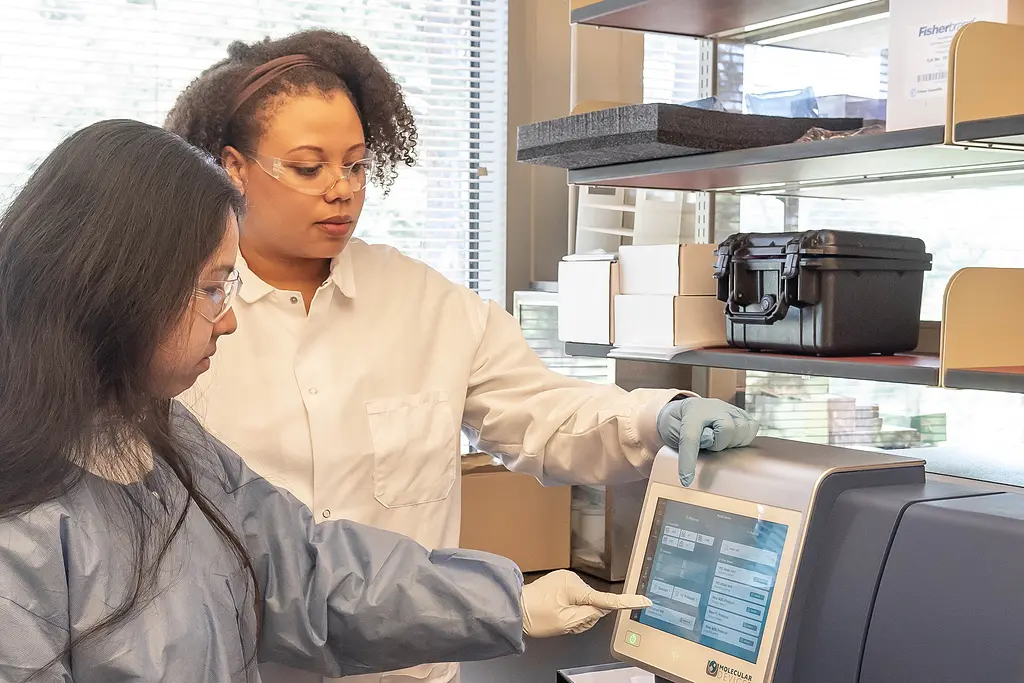Dr. Imari Walker training junior chemist Thuy Bui in the operation of a plate reader in the CARES lab. Photo Credit: Laurie Stella
In recent years, researchers have strengthened their focus on the issues of environmental justice, which addresses the disproportionate and negative impacts of environmental exposures on individuals from certain racial, ethnic, and minority groups. These groups have historically been excluded from environmental health research studies, therefore it is essential to develop a better understanding of the disparities minoritized individuals face to provide innovative and timely solutions for equitable protection of their health.
About the NCCU-RTI Center for Applied Research In Environmental Sciences (CARES)
Building on the longstanding strategic partnership between RTI International and NC Central University, the new NCCU-RTI Center for Applied Research in Environmental Sciences (CARES) was established in 2022 to support Environmental Justice efforts. CARES leverages the strengths of the two institutions to establish research collaborations and laboratory training in environmental modeling, cell based toxicology, image analysis and other research tools with a unique focus on health disparities and environmental justice.
We sat down with research scientists James Harrington and Wanda Bodnar to talk about how CARES is addressing environmental injustices and helping communities across North Carolina.
Q: What is environmental justice and why is it important?
The EPA’s Office of Environmental Justice and External Civil Rights (OEJECR) defines environmental justice as the fair treatment and involvement of all people for implementing and enforcing environmental laws, policies, and regulation. This means that individuals, regardless of race, color, national origin, and income, are to be treated fairly and equally under environmental policy. No one should experience negative environmental impacts at a disproportionate rate.
Working towards environmental justice is important to rectify the history of environmental injustices experienced by minoritized individuals and communities. Environmental injustice can be anything from living near an industrial area with poor air quality to the lack of access to safe drinking water, with the common theme being that the impacted individuals didn’t have a say in the processes that resulted in the poor conditions and generally don’t have the resources to fight against the situation. These injustices consequently produce negative health effects and shorter life expectancies in the impacted communities. For example, studies have shown that individuals, specifically children, living with air pollution disparities have a higher risk of developing asthma, lung cancer, respiratory problems, heart diseases, immune system defects, and chronic obstructive pulmonary diseases. Studies have also shown that predominately Black communities and low-income communities often have higher levels of exposure to air pollution than predominately White communities.
Despite government agencies and administrations becoming more aware of and working to address environmental injustices, the problem persists. This is one of many reasons why our team partnered with NCCU to study and provide timely solutions and about existing environmental injustices.
Tell us about the partnership between RTI and NCCU
We’ve had a long relationship with NCCU through research projects and the university collaborations office and a shared devotion to improving environmental health. As time passed, we realized that our two organizations had complementary skills and specialties that would allow us to perform more impactful research together than we could do individually. A formal partnership would provide synergies in basic and applied research that could be done in collaboration with historically under-resourced communities in our own backyard, empowering residents to have some agency over the environment in which they live.
When our directors, Dr. Keith Levine and Dr. Deepak Kumar began to discuss what form this partnership could take, the idea of a joint laboratory for research and training seemed like a natural fit. The mission of the university to perform state-of-the-art research and prepare students to make an impact after graduation aligns well with RTI’s commitment to training and mentoring our future workforce and our vision of delivering science-based solutions to the world’s most critical problems. RTI has a deep bench of thought leaders in environmental exposure, laboratory analysis, and environmental justice analyses and state-of-the-art instrumentation, and NCCU has community connections and experience with biochemical measurements in cellular models that can give insight into the toxic effects of chemicals, so the complementary strengths held great potential to address big challenges in our communities.
Over time, our Analytical Science Division and NCCU’s Biomedical and Biotechnology Research Institute designed and stocked a space on RTI’s campus to study environmental exposures that disproportionately impact Black and Hispanic communities, with an emphasis on communities close to home. In May of 2022, we officially opened the shared lab space. It's the first part of the center where NCCU students can come to work directly with RTI researchers on joint research projects to understand the biological effects of exposure to chemicals in the environment using cellular models for toxicological research and non-targeted chemical analysis, which are advanced research tools that will prepare students to enter the modern environmental health work force.

RTI hosted a ribbon cutting to celebrate the launch of the NCCU-RTI Center for Applied Research in Environmental Sciences (CARES). Photo Credit: Adam Jennings
Q: What is CARES doing to solve environmental injustice?
Often the biological effect of exposure to chemicals isn’t known, especially when the chemical is an emerging contaminant of concern and isn’t yet well-studied. Our research will focus on understanding the effects of these emerging contaminants that have been linked to disproportionate exposures to help understand the risks of being exposed to the chemicals. Once we have a better understanding of the risks of these chemicals, we can communicate these findings to members of the community and work with them to design appropriate strategies to prevent exposure so that they can live healthier lives. This work can help to empower communities and individuals that have been ignored or marginalized by forces with more power than them.
Understanding the toxic effects can also be translated to policy impacts in regulations and enforcement. One of RTI’s strengths is our ability to do impactful work and to translate the outcomes into practices to improve health and wellbeing. These outcomes can be key to addressing systemic injustices such as decreasing the levels of toxic contaminants in the environment or in communities.
Q: What are some of the biggest environmental justice challenges that CARES is hoping to address?
Several environmental justice issues have been identified across the state, many of which are relevant to other areas of the country and world. Access to clean drinking water and air pollution are important concerns that have been shown to disproportionately impact communities of color in the state. Black communities are known to be exposed to higher levels of particulate matter in the air, which has been linked to cardiovascular disease and other health problems.
We’ve collaborated with researchers at UNC and NC State to study lead in drinking water, and our work has shown that in periurban areas, neighborhoods located within city limits that are not connected to city utilities and that have higher Black populations, drinking water can contain higher levels of contaminants like lead and perfluoroalkyl substances, or PFAS. There are also concerns around climate resilience and the disproportionate effects that increased heat or severe weather events can have on minoritized and under-resourced people as society tries to address the effects of human-based carbon output into the environment.
Q: What are the role and the goals of education in the CARES program?
We’re looking to literally change the face of the science and policies that make up the field of environmental justice. The goal of the center is to produce better environmental health outcomes in minoritized communities, and one of the most important factors in that pursuit is the relationship between communities and the professionals working with them. Having a greater variety of perspectives and lived experiences that comes from a more diverse environmental health work force can provide better outcomes through a deeper understanding of community concerns and the cultural context that people are living in. This deeper understanding can build trust in the community and produce higher involvement in study design and study participation in communities that may not have historically trusted researchers that worked *on* them rather than *with* them. We hope to contribute to the diversity of the fields around environmental health by empowering students with the tools and skills they need to make transformative changes in environmental health research and public health policies.
Q: What is your hope for the future of CARES?
We have big plans for the center in the future, including expanding our collaborations to encompass more fields to identify, understand, and address environmental justice challenges. This will have to include climate research, economics, and risk communication, among other areas. The work must reach beyond the basic science of identifying and measuring chemicals to realize the full promise of the collaboration and to have the greatest impact in communities. We also hope to play a role in helping to expand diverse representation in the environmental sciences to support the overall goal of bringing long-overdue justice to communities across the state and producing results that can be applied to areas across the country and world.


